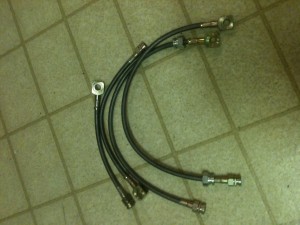
Before installation, a picture of my new brake lines for my Camaro Delco Morraine brakes. These are brake lines for GM Brakes found in third gen F-bodies.
Brake lines are one of the most important things in your entire braking system. If a brake line blows, you can lose at least 50-80% of your brakes. When you step on your brakes, there can be almost 2000 psi of pressure going through those lines.
Air and dirt are the main enemy of your brake lines. A small slow leak is almost just as bad as a sudden bursting of the brake lines because a small leak allows air to enter the hydraulic system. Remember, air is compressible which means that when you press on the brakes, part of the pressure is used just to bend the air instead of forcing the brake fluid to press the caliper pistons of the brakes.
LEAKS ARE THE ENEMY!
Check:
-the low fluid level in the master cylinder reservoir or wet spots on the driveway,
-dampness on the back of a brake drum or if the brake warning light comes on
Any of the above may mean an air leak in the brakes!
Obvious places for a leak include around the master cylinder, calipers, wheel cylinders or brake hoses or a line connection. Not so obvious places to spot a leak are places where the brake line runs inside a frame rail, rocker panel, inside the floor pan or trunk. Or the fluid could be disappearing into the engine through a leak in the power brake vacuum booster. Check the inside of the brake booster vacuum hose and if you find fluid, the booster diaphragm is leaking. This means rebuilding or replacing the booster.
If you are inspecting steel brake lines, look for dampness around connections or where there are bends. Look for stains or corrosion and check for chafing, loose or missing support clips, kinks, dents or damaged armor. Look for rust. This is a major problem with some “newer” GM vehicles manufactured after 2000. And they are not obvious leaks! Sometimes the leak isn’t visible as the brake line runs through the frame rail or rocker panel or inside the car.
If you are inspecting rubber hoses, look for cracks, splits and breaks. Rubber can bulge or swell over time indicating internal damage or deterioration. The inner liner has problem broken and it’s time to replace the hose. It helps a lot to have a helper depress the brake pedal while you observe each hose. If you see a bubble or blister rise on any part of the hose or if the hose swells, replace the hose!
When you are changing the brakes, never allow the caliper to hang by its hose when doing brake work. Always hang it from a piece of wire so that the weight of the caliper can’t damage the hose.
Odd things that can happen with brake hoses:
1. The rubber deteriorates inside the hose and a small flap inside the hose lifts up and plugs the line. This prevents brake pressure from reaching the wheel causing a brake pull when the brakes are applied.
2. Debris in the brake fluid or a crushed or kinked steel line can block the line. Sometimes the pressure will get through to press the brakes, but when you let go of the brakes, the blockage prevents pressure from releasing back to the master cylinder causing the brake to drag.
Brake lines are like the arteries in your body. They deliver the fluid that does the work…in this case STOPPING THE CAR!
Make sure you inspect the brake lines any time you’re under the vehicle. It doesn’t take much, just take a flash light and look at them. Any bulges? Any brake fluid anywhere? Any rust on steel lines? Any kinks or crushed lines?
Replace them! And if you’re using steel, use “approved” double-walled welded steel tubing and tubing of the same original size. (The size of the lines affects brake how much fluid hits the caliper. Use the stock size or you will hurt brake balance!)
Whether you’re using steel lines or hoses, make sure you check the lines regularly and replace them if you notice a problem. They are NOT supposed to last forever! Although Teflon coated lines do last longer, if you can afford it, it can be worth it.
